

OCTOBER • VOL. 10 • SERIES OF 2022
INSIGHTS is a monthly publication of BDB LAW to inform, update and provide perspectives to our clients and readers on significant tax-related court decisions and regulatory issuances (includes BIR, SEC, BSP, and various government agencies).

DISCLAIMER: The contents of this Insights are summaries of selected issuances from various government agencies, Court decisions, and articles written by our experts. They are intended for guidance only and as such should not be regarded as a substitute for professional advice.
Copyright © 2022 by Du-Baladad and Associates (BDB Law). All rights reserved. No part of this issue covered by this copyright may be produced and/or used in any form or by any means – graphic, electronic, and mechanical without the written permission of the publisher.
What's Inside ...
- HIGHLIGHTS FOR SEPTEMBER 2022
- SIGNIFICANT COURT DECISIONS
- Court of Tax Appeals
- SIGNIFICANT REGULATORY ISSUANCES
- Bureau of Internal Revenue
- Securities and Exchange Commission
- Bangko Sentral Ng Pilipinas
- Department of Finance
- Fiscal Incentives Review Board
- PUBLISHED ARTICLE
- SUN WIND OCEAN
- OUR EXPERTS
- The Personalities
- The Personalities


HIGHLIGHTS for SEPTEMBER 2022
COURT OF TAX APPEALS DECISIONS
- The invoicing requirements stated under Sections 110 and 113 of the NIRC of 1997, as amended, do not apply to imported goods. (Philex Mining Corporation v. Commissioner of Internal Revenue, CTA EB No. 2497 (CTA Case No. 10037, September 29, 2022)
- Based on the prescribed form in RDAO No. 05-01, the amount of taxes due is not required to be indicated in the Waiver. However, it is still required that the specific type of tax must be indicated in the Waiver. (Commissioner of Internal Revenue v. First Philippine Industrial Corp., C.T.A. EB Case No. 2376 (C.T.A. Case No. 9000), September 29, 2022)
- There being no written power of attorney, it cannot be concluded that the act of receiving the FDDA was within the scope of the agent’s authority. (Spouses Emmanuel D. Pacquiao and Jinkee J. Pacquiao v. Commissioner of Internal Revenue, CTA Case No. 8683, September 29, 2022)
- The imposition of tax rates, over and above the ceiling rates imposed by statute, is beyond the scope of corporate powers of the local government unit. (City of Angeles & City Treasurer of Angeles v. Super Shopping Market, Inc. & Sanford Marketing Corporation, CTA AC No. 237, September 28, 2022)
- Electronic service was indeed complete by the successful sending of the COC’s Notice to Claim to taxpayer's registered e-mail address, despite the latter's failure to acknowledge the same. (Service Trading Corporation v. Hon. Rey Leonardo Guerrero, in his official capacity as Commissioner of Customs, et. Al, STA Case No. 10088, September 22, 2022)
- Under the Revised Makati Revenue Code, persons who are subject to professional tax are not included in the term contractor. (Nelia A. Barlis v. GF & Partners, Architects, Co., CTA AC No. 247 (Civil Case No. 15-315), September 16, 2022)
- No penalties shall be imposed for the taxpayers who e-filed earlier and paid later but on or before the due date of the applicable tax. Only taxes paid after the due date shall the corresponding penalties be imposed. (Commissioner of Internal Revenue v. Tann Philippines, Incorporated, CTA EB No. 2415 (CTA Case No. 9433), September 14, 2022)
- The condition for an LOA to remain valid even after the 30-day period is its subsequent revalidation, and not the taxpayer's acceptance thereof. (Commissioner of Internal Revenue v. Joselito Ranada Laraya, CTA EB No. 2490, (CTA Case No. 8890), September 14, 2022)
- The failure to comply with the 120-day rule does not void LOA ab initio. The expiration of the 120-day period merely renders an LOA unenforceable. (Commissioner of Internal Revenue v. Chun Lang Chan, CTA EB No. 2489, (CTA Case No. 9758), September 14, 2022)
BIR ISSUANCES
- RR No. 12-2022, September 13, 2022 – This prescribes the policies and guidelines for the availment of incentives under Republic Act No. 9999 (Free Legal Assistance Act of 2010).
- RMC No. 127-2022, September 7, 2022 – This lifts and removes the suspension and prohibition on the issuance of new MOs.
- RMC No. 131-2022, September 28, 2022 – This announces the availability of Offline Electronic Bureau of Internal Revenue Forms (eBIRForms) Package Version 7.9.3.
- RMO No. 37-2022, September 16, 2022 – This amends the policies and guidelines for the issuance of International Carriers Special Certificate.
- RMO No. 40-2022, September 29, 2022 – This prescribes the guidelines and procedures in the conduct of enforcement operations, forfeiture and prosecution of cases.
- RMO No. 41-2022, September 29, 2022 – This discontinues the issuance of Tax Verification Notice (TVN) for Estate Tax cases where the decedent has no registered business.
- RMO No. 42-2022, September 29, 2022 – This prescribes the enhanced BIR Digital Transformation Roadmap 2020-2030.
- RMO No. 43-2022, September 29, 2022 – This prescribes the policies, guidelines and procedures in the issuance and use of Notice to Issue Receipt/Invoice (NIRI).
SEC ISSUANCES
- SEC-OGC Opinion No. 22-12 dated September 27, 2022 – Issuance of Shares of Stocks at a Premium without Increasing the Authorized Capital Stock
- SEC-OGC Opinion No. 22-13 dated September 30, 2022 – Nullification of the Additional Paid in Capital and its subsequent conversion into subscribed capital will violate the Trust Fund Doctrine.
- SEC Memorandum Circular No. 8, s. 2022, dated September 19, 2022 – Guidelines on Arbitration of Intra-Corporate Disputes for Corporations
BSP ISSUANCES
- BSP Circular No. 1152, September 5, 2022 – This provides the amendments to Section 403 and 414 of the MORB and Sections 403-Q and 414-Q of the MORNBI.
- BSP Circular No. 1154, September 14, 2022 - This provides the prudential requirements applicable to digital banks.
- BSP Circular Letter No. 1155, September 21, 2022 - This provides the amendments to the alternative compliance with the reserve requirements of banks and non-bank financial institutions with quasi-banking functions.
IC ISSUANCES
- IC Circular Letter CL-2022-20, April 11, 2022 – This amends the transitory provisions under CL No. 2020-100.
- L-2022-10, April 5, 2022 – This provides for the clarification on Section 1(f) Guideline VII of the Insurance Guidelines on Rule XVI of the Omnibus Rules and Regulations Implementing Republic Act 8042.
- L-2022-13, April 26, 2022 – This answers the query on Applicable interest rates in case of refusal to pay by the insurer of the loss or damage within the prescribed period.
DOF ISSUANCES
- DOF Opinion 015-2022 dated September 26, 2022 - The second sentence of Paragraph 4(a) of the 2002 Exchange Notes explicitly excluded locally purchased motor vehicles from the list of VAT-exempt goods and services procured in the Philippines.
FIRB ISSUANCES
- Memorandum Order No. 61, May 24, 2022 – Approved 2022 Strategic Investment Plan (SIPP) lists all approved priority activities and projects, as mandated by the CREATE Act.

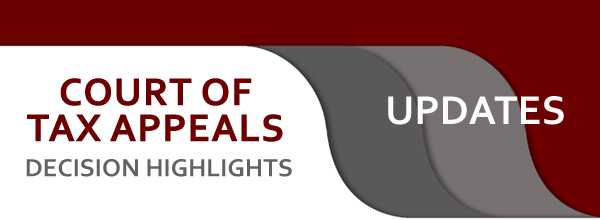
The invoicing requirements under Sections 110 and 113 of the NIRC of 1997, as amended, are not applicable to imported goods sold by foreign sellers.
The taxpayer argues that the invoicing requirements stated under Sections 110 and 113 of the NIRC of 1997, as amended, cannot apply to input VAT credits for transactions involving importation of goods considering that the vendors of imported goods are foreign entities not subject to Philippine laws and are not bound to comply with Philippine tax laws.
The Court agrees with the taxpayer. As can be gleaned from Sections 113(A) and (B) of the NIRC of 1997, as amended, and Sections 4.110-1 and 4.110-8(a) of RR No. 16-2005, it is the VAT-registered person who is required to issue a VAT invoice for every sale, barter or exchange of goods or properties. Corollary thereto, the invoicing requirements under Sections 110 and 113 of the NIRC of 1997, as amended, are not applicable to imported goods sold by foreign sellers. As the foreign sellers of the imported goods are not registered with the BIR and are not VAT-registered, they cannot be expected to issue VAT invoices.
In fact, in Section 4.11 0-8(a) of RR No. 16-2005, the BIR made a distinction between the substantiation requirements of input tax credits for importation of goods and domestic purchase of goods and properties. A VAT invoice is required only for domestic purchase of goods and properties, while an import entry or other equivalent document showing actual payment of VAT on the imported goods is required for importation of goods. (Philex Mining Corporation vs. Commissioner of Internal Revenue, CTA EB No. 2497 (CTA Case No. 10037, September 29, 2022)
Based on the prescribed form in RDAO No. 05-01, the amount of taxes due is not required to be indicated in the Waiver. However, it is still required that the specific type of tax must be indicated in the Waiver.
The CTA Division ruled that the Waivers of the Defense of Prescription under the Statute of Limitations are not valid for failure to indicate the kind and amount of taxes to be assessed or collected. Hence, the same did not effectively extend the prescriptive period under Section 203 of the NIRC of 1997, as amended. The CIR, however, insists that the waivers are valid and binding because RMO No. 20-90 and RDAO No. 05-01 are issuances that are merely internal and do not grant any vested rights to any taxpayer.
The CTA En Banc, finding no error in the ruling of the CTA Division, noted that in RMC No. 29-12, the BIR clarified that the form of the Waiver prescribed under RMO No. 20-90 no longer applies starting August 2, 2001 but the revised form as prescribed under RDAO No. 05-01. Based on the prescribed form in RDAO No. 05-01, the amount of taxes due is not required to be indicated in the Waiver. However, it is still required that the specific type of tax must be indicated in the Waiver, which the subject Waivers in this case failed to satisfy. Thus, the Court En Banc finds the subject Waivers to be defective for failure to indicate the type of taxes. As a result, the subject Waivers did not extend the prescriptive period under Section 203 of the NIRC of 1997, as amended. (Commissioner of Internal Revenue v. First Philippine Industrial Corp., CTA EB Case No. 2376 (CTA Case No. 9000), September 29, 2022)
There being no written power of attorney, it cannot be concluded that the act of receiving the FDDA was within the scope of the agent’s authority.
The CIR strongly insists that a Final Decision on Disputed Assessment (FDDA) was validly served against a taxpayer through personal service, through a certain Mr. Erwin Jamora - the supposed "duly authorized representative" of taxpayers.
The CTA in Division, however, ruled against the contention that Mr. Jamora was indeed duly authorized to receive said FDDA on behalf of the taxpayer. Since the pertinent legal provision being followed by the word "duly" is "authorized representative", the law or rule of law to be considered are the essential elements of agency. Be that as it may, even granting that Mr. Jamora was indeed an agent of taxpayers, his act cannot be deemed as performed within his authority, in the absence of a written power of attorney executed by taxpayers, pursuant to Article 1900 of the Civil Code of the Philippines. Thus, there being no written power of attorney from which this Court can verify the terms thereof, the Court cannot conclude that the act of receiving the FDDA was within the scope of Mr. Jamora's authority, insofar as the BIR is concerned. (Spouses Emmanuel D. Pacquiao and Jinkee J. Pacquiao vs. Commissioner of Internal Revenue, CTA Case No. 8683, September 29, 2022)
The imposition of tax rates, over and above the ceiling rates imposed by statute, is beyond the scope of corporate powers of the local government unit.
The local government of Angeles City imposed and collected Local Business Tax (LBT) as follows: (1) ¾ of 3.3% (or 2.475%) for retailers of essential commodities with gross sales receipt of not exceeding P400,000.00 during the preceding calendar year; and (2) ¾ of 1.65% (or 1.2375%) for retailers with gross sales receipts exceeding P400,000.00 during the preceding calendar year. As the taxpayer assailed the imposition of the foregoing taxes, the local government of Angeles City argued that its imposition of LBT is valid pursuant to Section 191 of the Local Government Code. However, the taxpayer counters that the allowable increase on the imposistion of LBT for cities under Section 191 is subject to the limitation under Section 151 of the LGC.
The CTA ruled that the tax rates imposed by the Angeles City Revenue Code on retailers of essential commodities exceeded the maximum allowable rates of tax prescribed by statute. To be specific, the rates of 2.475% and 1.2375%, exceeded the statutory maximum of 1.5% and 0.75%, respectively. The imposition of tax rates, over and above the ceiling rates imposed by statute is beyond the scope of corporate powers of the local government unit. It is clearly ultra vires, for being contrary to Section 151 of the LGC of 1991, as amended. (City of Angeles & City Treasurer of Angeles vs. Super Shopping Market, Inc. & Sanford Marketing Corporation, CTA AC No. 237, September 28, 2022)
Electronic service was indeed complete by the successful sending of COC’s Notice to Claim to taxpayer's registered e-mail address, despite the latter's failure to acknowledge the same.
The taxpayer impugns the Consolidated Order affirming a Decree of Abandonment and a Resolution approving the public auction of the taxpayer’s rice shipment. It contends that the e-mail notice from the Bureau of Customs (BOC) is invalid since it did not acknowledge the receipt thereof, nor did the BOC present an affidavit of the party serving the same, as required by CMO No. 16- 2019.
The CTA is not persuaded. The Court notes Customs Administrative Order (CAO) No. 17-2019, issued by Commissioner of Customs (COC), which states that "[n]otwithstanding their failure to acknowledge duly sent notices and communications to the accredited importer's registered electronic mail address, the same shall be deemed received upon successful transmittal thereof." Though CAO No. 17-2019 was yet to be issued at the time the Notice to Claim the rice shipments sent through e-mail using the address This email address is being protected from spambots. You need JavaScript enabled to view it. was received by the taxpayer on January 25, 2019, the subsequent issuance thereof fortifies the conclusion that electronic service was indeed complete by the successful sending of COC’s Notice to Claim the rice shipments covered by BL No. 550810053760 to the taxpayer's registered e-mail address, despite the latter's failure to acknowledge the same. (Service Trading Corporation vs. Hon. Rey Leonardo Guerrero, in his official capacity as Commissioner of Customs, et. Al, STA Case No. 10088, September 22, 2022.)
Under the Revised Makati Revenue Code, persons who are subject to professional tax are not included in the term contractor.
The taxpayer is an architectural firm operating as a general professional partnership (GPP) and has been paying its professional tax with the City of Makati under the Revised Makati Revenue Code (RMRC). However, the taxpayer is being assessed by the City of Makati for local business tax under Sec. 3A.02(g) of the RMRC. The City of Makati claims that the taxpayer was assessed not as a GPP but as a contractor or as an owner or operator of business establishment rendering or offering the services enumerated in the said section.
The Court found that Section 3A.01(t) of the RMRC defines a contractor as persons, natural or juridical, not subject to professional tax, among others. Under this Section, persons who are subject to professional tax are not included in the term contractor. Hence, they are not subject to the local business tax imposed under Section 3A.02(g) of the RMRC.
Given the foregoing and in the absence of any convincing evidence and argument that the taxpayer is engaged in any trade or business other than the general practice of architecture as a profession, the Court ruled that the taxpayer is not subject to the local business tax imposed under Section 3A.02(g) of the RMRC. [Nelia A. Barlis v. GF & Partners, Architects, Co., CTA AC No. 247 (Civil Case No. 15-315), September 16, 2022]
No penalties shall be imposed for taxpayers who e-filed earlier and paid later but on or before the due date of the applicable tax. Only taxes paid after the due date shall the corresponding penalties be imposed..
On January 24, 2014, the taxpayer filed, without payment, through the BIR's Electronic Filing and Payment System (eFPS) its Quarterly VAT Return. On January 28, 2014, the taxpayer paid the tax due stated in the aforesaid quarterly VAT Return via the eFPS. The same was considered as late payment of one day, the deadline being January 27, 2014 (Monday), on which 25% surcharge, interest, and compromise penalties were imposed.
The Court ruled that the electronic filing of the return ahead of the payment of the tax due is still in accordance with the "pay-as-you-file" principle, and no penalties shall be imposed for taxpayers who e-filed earlier and paid later but on or before the due date of the applicable tax. It logically follows, therefore, that if the applicable tax is paid after the due date, the corresponding penalties shall be imposed. [Commissioner of Internal Revenue v. Tann Philippines, Incorporated, CTA EB No. 2415 (CTA Case No. 9433), September 14, 2022]
The condition for an LOA to remain valid even after the 30-day period is its subsequent revalidation, and not the taxpayer's acceptance thereof.
The taxpayer received on June 30, 2009 the LOA issued on May 15, 2009. The CIR argues that instead of refusing the service of LOA, the taxpayer knowingly accepted the same despite being served beyond 30 days from its issuance. Accordingly, the taxpayer’s acceptance thereof precludes any question regarding the validity of its service.
The Court ruled that, under RMO No. 43-90 and RAMO No. 01-00, the LOA must be served or presented to the taxpayer within thirty (30) days from its date of issuance, otherwise it becomes null and void unless revalidated. RAMO No. 01-00 further provides that the taxpayer has the right to refuse its service if presented beyond the 30-day period. To emphasize, the condition for an LOA to remain valid even after the 30-day period is its subsequent revalidation, and not the taxpayer's acceptance thereof. In the present case, the LOA was served to the taxpayer beyond the 30-day period. Considering that it was not revalidated, the LOA is deemed null and void, even if it was subsequently accepted by the taxpayer, the same did not cure the LOA's defect. [Commissioner of Internal Revenue v. Joselito Ranada Laraya, CTA EB No. 2490, (CTA Case No. 8890), September 14, 2022]
The failure to comply with the 120-day rule does not void LOA ab initio. The expiration of the 120-day period merely renders an LOA unenforceable.
The taxpayer argues that that the Revenue Officer (RO) acted beyond his authority by continuing with the audit beyond the prescribed 120-day period without revalidating the LOA.
The Court ruled that the failure to comply with the 120-day rule does not void LOA ab initio. The expiration of the 120-day period merely renders an LOA unenforceable, inasmuch as the revenue officer must first seek ratification of his expired authority to audit to be able to validly continue investigation beyond the first 120 days. The 120-day period was intended as an internal efficiency measure: to expedite the conduct of audits and ensure that the BIR examiners regularly report open investigations and their progress. [Commissioner of Internal Revenue v. Chun Lang Chan, CTA EB No. 2489, (CTA Case No. 9758), September 14, 2022]

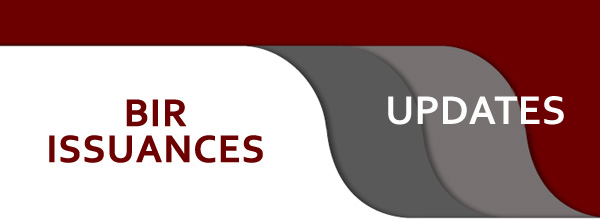
RR No. 12-2022, September 13, 2022
This prescribes the policies and guidelines for the availment of incentives under Republic Act No. 9999.
This prescribes the policies and guidelines for the availment of incentives under Republic Act No. 9999.
Lawyers or professional partnerships rendering actual free Legal Services shall be entitled to an allowable deduction from the gross income equivalent to the lower of the amount that could have been collected for the actual free Legal Services rendered or ten percent (10%) of the gross income derived from the actual performance of the legal profession.
The actual free Legal Services shall be exclusive of the minimum sixty (60)-hour mandatory legal aid services rendered to indigent litigants as required under the Rule on Mandatory Legal Aid Services for Practicing Lawyers, under Bar Matter No. 2012, issued by the Supreme Court.
In order to avail of the incentives, the lawyers or professional partnerships shall attach to their ITR for the period when the deduction was claimed the following documents:
a. Certification from the Public Attorney's Office, the Department of Justice or accredited association of the Supreme Court indicating that the legal services to be provided are within the services defined by the Supreme Court, the agencies cannot provide the Legal Services to be provided by the private counsel and the Legal Services were actually undertaken;
b. Accomplished BIR Form No. 1701 (for individual lawyers) or BIR Form No. 1702-EX (for general professional partnership), particularly Schedules 5 and 2, respectively, on "Special Allowable Itemized Deductions; and
c. Sworn Statement of the Lawyer or managing partner (in case of professional partnership) as to the amount that could have been collected for the actual free legal service.
RMC No. 127-2022, September 7, 2022
This lifts and removes the suspension and prohibition on the issuance of new MOs.
This lifts and removes the suspension and prohibition on the issuance of new MOs authorizing the conduct of enforcement activities and operations of any kind, and issuance of new MOs authorizing such activities and operations.
RMC No. 137-2022
October 14, 2022
This provides clarificatory guidelines on the availment of VAT zero rate (0%) on HMO Plans Acquired by REEs and prescribes the uniform template of "detailed information” thereof.
RMC No. 131-2022, September 28, 2022
Availability of Offline Electronic Bureau of Internal Revenue Forms (eBIRForms) Package Version 7.9.3.
This announces the availability of Offline Electronic Bureau of Internal Revenue Forms (eBIRForms) Package Version 7.9.3.
The new Offline eBIRForms Package has the following modifications:
A. Additional Alphanumeric Tax Codes (ATCs) in BIR Form No. 0605 to be used by the International Carriers in paying their taxes in reference to Revenue Memorandum Order No. 37-2022, to wit:
| Income Tax | Tax Type | ATC |
| IT | IC 080 | |
| Percentage Tax | PT | PT 041 |
| Documentary Stamp Tax | DS | DS 010 |
B. Revised Terms of Service Agreement (TOSA), attached as Annex A.
C. Required official e-mail address of the taxpayer to be provided in the eBIRForms profile page. The e-mail shall be used as an additional mode of serving BIR orders, notices, letters, communications and other processes.
RMO No. 37-2022, September 16, 2022
This amends the policies and guidelines for the issuance of International Carriers Special Certificate.
This amends the policies and guidelines for the issuance of International Carriers Special Certificate (ICSC).
The application for BIR ICSC requires that the ICSC shall only be issued upon payment of 3% common carrier’s tax (Percentage Tax) and 2.5% Income Tax (Gross Philippine Billings) unless the preferential rate is used pursuant to Sections 118(B) and 28(A)(3)(b), respectively, of the 1997 Tax Code, as amended. The Regional Director of RR No. 7A-Quezon City shall, upon application (Annex C) and evaluation of documentary requirements (Annex D), issue the ICSC. The documentary requirements to be submitted before the issuance of ICSC are listed in Section III.C.3 of the Order.
The ₱100 certification fee and ₱30 loose Documentary Stamp Tax (DST) shall be filed electronically using BIR Form No. 0605 through eBIRForms Package and paid online through BIR ePayment Channels separately. For the ePayment of loose DST, constructive affixing of DST on the Certificate shall be done by the concerned office by stamping “DST Paid Online” including the Payment Transaction Number and Date of Payment, at the lower portion of the Certificate.
Online application for International Carrier Service Certificate shall be made through the BIR website at https://www.bir.gov.ph under “eServices” icon and by clicking the “eICSC” icon. An application reference number shall be received upon successful submission. The documentary requirements shall be electronically filed thru the BIR ICSC Centralized email address: This email address is being protected from spambots. You need JavaScript enabled to view it. with “Application for ICSC [REF. NO. _______________]” as email subject line format. All the required documentary requirements shall be prepared and scanned in PDF copy and compressed into one (1) .zip file which shall not exceed 10MB file size.
RMO No. 40-2022, September 29, 2022
This prescribes the guidelines and procedures in the conduct of enforcement operations, forfeiture and prosecution of cases.
This prescribes the guidelines and procedures in the conduct of enforcement operations, forfeiture and prosecution of cases relative to the unlicensed/illicit/unauthorized production, importation, trade sale or possession of articles subject to Excise Tax, including raw materials, packages, cigarette paper, tipping paper, cigarette filter tips, ingredients, machinery, equipment, apparatus, mechanical contrivances, and removable fixture of any sort used for their production, and the unlicensed/illicit/ unauthorized use or possession of false, counterfeit, restored or altered BIR internal revenue stamps, labels or tags.
A BIR STRIKE GROUP shall be composed of two (2) Teams to be constituted by the designated officers who shall be responsible in the conduct of the undertaking.
RMO No. 41-2022, September 29, 2022
This discontinues the issuance of Tax Verification Notice (TVN) for Estate Tax cases where the decedent has no registered business.
This discontinues the issuance of Tax Verification Notice (TVN) for Estate Tax cases where the decedent has no registered business. This is in order to comply with the “Ease of Doing Business” under Republic Act No. 11032 in processing requests for issuance of Certificate Authorizing Registration (CAR) related to the transfer of properties left by the decedent.
RMO No. 42-2022, September 29, 2022
This prescribes the enhanced BIR Digital Transformation Roadmap 2020-2030.
This prescribes the enhanced BIR Digital Transformation Roadmap 2020-2030.
The BIR Digital Transformation (DX) Program aims to transform the Bureau of Internal Revenue into a data-driven organization through a digitally empowered and resilient workforce utilizing reliable, scalable, and robust digital technologies and infrastructure to innovate BIR services and elevate taxpayer service.
The BIR DX Program is anchored on four (4) major pillars representing the strategic objectives to be pursued under the program, to wit:
1. Pillar I: Strengthening the BIR Organization
2. Pillar II: Modernizing the Digital Backbone of the BIR
3. Pillar Ill: Enhancing Policies, Governance and Standards
4. Pillar IV: Elevating the Taxpayers Experience and Innovating the BIR Services
RMO No. 43-2022, September 29, 2022
This prescribes the policies, guidelines and procedures in the issuance and use of Notice to Issue Receipt/Invoice (NIRI).
This prescribes the policies, guidelines and procedures in the issuance and use of Notice to Issue Receipt/Invoice (NIRI) by the following pursuant to Revenue Regulations (RR) No. 10-2019:
a. New Business Registrants (NBR) head office and branches by the Revenue District office (RDO) where the taxpayer is registered.
b. Online sellers and merchants, vloggers, social media influencers, online content creators earning income from the platform and/or advertising.
"Ask for Receipt" Notice previously issued by the RDO/LT Division to registered business taxpayers based on RR No. 7-2005 shall still be valid until June 30, 2023, and it shall be replaced through staggered issuance of NIRI to the existing business registrants based on the ending digit of the Taxpayer Identification Number (TIN), to wit:
| TIN Ending | Month |
|
1 and 2
|
Beginning October 3, 2022
|
| 3 and 4 | Beginning November 2, 2022 |
| 5 and 6 |
Beginning December 1, 2022 |
| 7 and 8 | Beginning January 2, 2023 |
| 9 and 0 | Beginning February 1, 2023 |


SEC-OGC Opinion No. 22-12 dated September 27, 2022
Re: Issuance of Shares of Stocks at a Premium without Increasing the Authorized Capital Stock
An investor invested Three Million and Seven Hundred Fifty Thousand Pesos (PHP3,750,000.00) in the Company, by subscribing five thousand (5,000) of its common shares, with a par value of One Hundred Pesos (PHP100.00) per share, for a subscription price of Seven Hundred Fifty Pesos (PHP750.00) for each share.
However, the BOI found it irregular for the Company to have a paid-up capital of Thirteen Million and Two Hundred Fifty Thousand Pesos (PHP13,250,000.00), which is more than its ACS of Ten Million Pesos (PHP10,000,000.00).
The SEC held that a company may be allowed to issue shares of stock at a premium. It is legal for a company to issue shares at a premium or over the par value of the shares as stated in its Articles of Incorporation (AOI), and for the subscribers of a corporation to pay more than the par value of the shares they subscribed as there is no law, rule or regulation that prohibits the same.
SEC-OGC Opinion No. 22-13 dated September 30, 2022
Nullification of the Additional Paid in Capital and its subsequent conversion into subscribed capital will violate the Trust Fund Doctrine.
CommVerge Philippines suffered recurring losses. To help CommVerge Philippines, its parent company CommVerge Holdings made advances to support the former's operations.
CommVerge Holdings has expressed its intention to recover the advances that was converted to APIC and CommVerge Philippines intends to return the same provided it can do so legally and without violating the Trust Fund Doctrine.
The SEC held that nullification of the APIC and its subsequent conversion into subscribed capital will violate the Trust Fund Doctrine.
When a corporate 'Trust Fund' will be used for purposes other than those enumerated in Ong Yong case (distribution of corporate capital only in three instances: (1) amendment of the Articles of Incorporation to reduce the authorized capital stock, (2) purchase of redeemable shares by the corporation, regardless of the existence of unrestricted retained earnings, and (3) dissolution and eventual liquidation of the corporation) i.e., to pay for the stockholder's additional subscription to capital stock, it will effectively result in the unauthorized distribution of the corporate Trust Fund, thereby violating the Trust Fund Doctrine.
It is clear that, "until the liquidation of the corporation, no part of the subscribed capital may be returned or released to the stockholder (except in the redemption of redeemable shares) without violating this principle." The corporate creditors, therefore, should have the first claim on the trust fund of the corporation, and the stockholders have no rights to it, until all the creditors are satisfied.
SEC Memorandum Circular No. 8, s. 2022, dated September 19, 2022
Guidelines on Arbitration of Intra-Corporate Disputes for Corporations.
These rules shall apply to appointments made by the Commission, upon the request of the parties, of arbitrators tasked to resolve intra-corporate disputes of domestic corporations in accordance with Section 181 of the RCC. These rules shall not apply if the Arbitration Agreement expressly states a seat or place of arbitration that is other than the Philippines.
An intra-corporate dispute shall not be referred to arbitration when it involves criminal offenses and interests of third parties.
The arbitral tribunal shall have the power to rule on its own jurisdiction and on questions relating to the validity of the arbitration agreement. When an intra-corporate dispute is filed with a Regional Trial Court, the court shall dismiss the case before the termination of the pre-trial conference, if it determines that an arbitration agreement is written in the corporation's articles of incorporation, by-laws, or in a separate agreement. The arbitral tribunal shall have the power to grant interim measures necessary to ensure enforcement of the award, prevent a miscarriage of justice, or otherwise protect the rights of the parties.

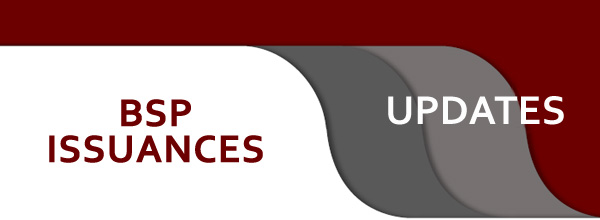
BSP Circular No. 1152, September 5, 2022
This provides the amendments to Section 403 and 414 of the MORB and Sections 403-Q and 414-Q of the MORNBI.
This circular provides the following guidelines for Trust Entities (TE) who intend to create a Unit Investment Trust Fund (UITF):
I. Manner of Creation:
a) Categories of UITF requiring prior BSP approval:
| i. Fixed income fund | v. feeder fund |
| ii. Multi-asset fund | vi. multi-class fund |
| iii. Equity fund | vii. distributing fund |
| iv. Fund-of-funds |
b) Categories of UITF requiring BSP notification:
A TE that intends to create a money market fund or a fund that falls under the categories listed in Item “a)” above which has had a fund under the same category previously approved by the BSP shall notify the BSP prior to offering the new fund to the public.
II. Qualification requirements:
1. Satisfy the prudential criteria;
2. Implement adequate risk management practices; and
3. Demonstrate operational readiness (in terms of personnel IT systems, policies and procedures, etc.) to manage the UITF it intends to create.
III. Launching period
A UITF shall be launched in accordance with the following timelines:
1. For a UITF requiring prior approval – within 1 year from date of TE receipt of BSP letter of approval; and
2. For a UITF requiring notification- within 1 year from receipt of BSP of the notification letter from the TE.
Failure to launch a UIF within prescribed period shall result in either an automatic revocation of the BSP approval or the consideration of the notification from the TE as “withdrawn.
BSP Circular No. 1154, September 14, 2022
This provides the prudential requirements applicable to digital banks.
Circular No. 1154 is amended to provide the following new prudential requirements of digital banks:
1. Minimum Required Capital – The minimum capitalization at all times of digital banks is P1 Billion.
2. Composition of the Board of Directors and Qualification of an officer – At least 1 member of the BODs and at least one senior management officer should have a minimum of 3 years of experience and technical knowledge in operating a business in the field of technology or e-commerce.
3. Required reserves against deposit and deposit substitutes- The rates of required reserves against deposit and deposit substitute liabilities shall be as follows:
| Demand deposits, NOW Accounts, Savings deposits, Time deposits, Negotiable CTDs, Long-Term Non-Negotiable Tax Exempt CTDs, Deposit Substitutes, Peso deposits lodged under due to foreign banks, Peso deposits lodged under due to Head Office/Branches/Agencies Abroad | 8% |
| Bonds | 3% |
| Basic deposit accounts | 0% |
| Long-term Negotiable CTDs and Mortgage/CHM Cert | N/A |
BSP Circular Letter No. 1155,
September 21, 2022
This provides the amendments to the alternative compliance with the reserve requirements of banks and non-bank financial institutions with quasi-banking functions.
Section 252/212-Q of the MORB/MORNBFI is amended as follows:
Allowable modes of alternative compliance. The following alternative modes of compliance with the required reserves against deposit and deposit substitute liabilities shall be allowed:
a. Peso-denominated loans that are granted to micro-, small-, and medium enterprises (MSMEs), as defined under Sec.332 (Definition of Terms), excluding banks and NBQBs that meet the definition of a small- and medium-enterprise, subject to the following conditions:
xxx
The use of MSME loans as allowable alternative compliance with the reserve requirement shall be available to banks/NBQBs from April 24, 2020 to June 30, 2023.
b. Peso-denominated loans that are granted to large enterprises, excluding banks and NBQBs that meet the definition of a large enterprise, subject to the following conditions:
xxx
The use of loans to a large enterprise as allowable alternative compliance with the reserve requirements shall be available to banks/NBQBs from May 29, 2020 to June 30, 2023.

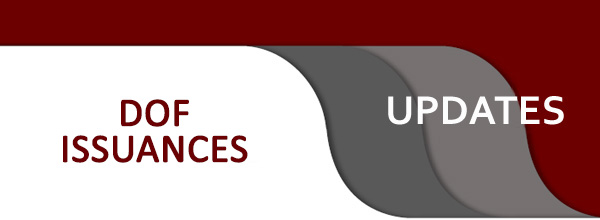
DOF Opinion 15-2022 dated September 26, 2022-10-22
The second sentence of Paragraph 4(a) of the 2002 Exchange Notes explicitly excluded locally purchased motor vehicles from the list of VAT-exempt goods and services procured in the Philippines
The taxpayer requested for the reversal of the BIR’s denial of its request for exemption from VAT and ad valorem tax on its local purchase of 1 unit 2022 Toyota Fortuner to be used for technical cooperation project. In its request for reversal, it submitted the TCA and 2002 Exchange Notes.
The DOF ruled in favour of the BIR insofar as the taxpayer is not exempt from VAT on its purchase of the motor vehicle. Nothing in the TCA and 2002 Exchange Notes provide for the VAT exemption. A perusal of Paragraph 4(a) of the 2002 Exchange Notes reveals that the first sentence deals with the exemption of imported material and motor vehicles while the second sentence deals with the exemption from VAT of materials and service, including consultancy services, procured in the Philippines. Hence, the second sentence explicitly excluded locally purchased motor vehicles from the list of VAT-exempt goods and services procured in the Philippines.

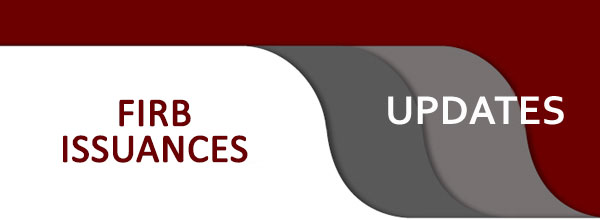
Memorandum Order No. 61, May 24, 2022
Approved 2022 Strategic Investment Plan (SIPP) lists all approved priority activities and projects, as mandated by the CREATE Act
The 2022 Strategic Investment Priority Plan (SIPP) List of Priority Activities
I. Tier I
This includes all activities listed in the 2020 Investment Priorities Plan, as amended Memorandum Circular No. 2021- 005, unless listed under Tier II or Tier III.
II. Tier II
This includes, but not limited to, the following activities:
1. Green Ecosystems - This covers electric vehicle (EV) assembly, manufacture of EV parts, components and systems, establishment and operations of EV infrastructure; manufacture of energy efficient maritime vessels and equipment; electronic devices and circuits for smart grid and renewable energy (includes wearable solar devices); bioplastics and biopolymers; renewable energy; energy efficiency and conservation projects; energy storage technologies; and integrated waste management, disposal & recycling.
2. Health related activities - This covers health related activities such as manufacturing in support of the Vaccine Self-Reliance Program or other health-related programs as endorsed by Department of Health (DOH), Department of Science and Technology (DOST) or other similar agencies; medicines; active pharmaceutical ingredients; and specialty hospitals.
3. Defense related activities - This covers defense related activities as endorsed by the Department of National Defense (DND), Armed Forces of the Philippines (AFP), or National Security Council (NSC).
4. Industrial Value - chain Gaps - This covers activities that will address value chain gaps in, among others, steel, textiles, chemicals; green metals processing, crude oil refining; and lab-scale wafer fabrication.
5. Food Security related activities - This covers products and services critical to competitively ensure food security or in support of green/organic agriculture, as endorsed by the Department of Agriculture (DA) or Philippine Council for Agriculture, Aquatic and Natural Resources Research and Development (PCAARRD).
III. Tier III
This includes, but not limited to, the following activities:
1. Research & development (R&D) and activities adopting advanced digital production technologies of the fourth industrial revolution, such as but limited to, robotics; artificial intelligence (AI); additive manufacturing; data analytics; digital transformative technologies, nanotechnology; biotechnology; production and/or adoption of new hybrid seeds; and other Industry 4.0 technologies.
2. Highly technical manufacturing and production of innovative products and services such as but not limited to manufacture of equipment, parts & services; commercialization of intellectual property (IP) and R&D products/services, aerospace, medical devices; internet of things devices and systems; full -scale wafer fabrications; and advanced materials.
3. Establishment of innovation support facilities such as but not limited to R&D hubs; Centers of Excellence; science & technology parks; innovation incubation center; tech startup, startup enablers; incubators & accelerators; and space-related infrastructures.
Pursuant to Section 302 of the CREATE Act, additional activities that comply with Section 296 of the CREATE Act can qualify under Tiers II and III; Provided that, the additional activities under Tier III are duly endorsed by the relevant agencies such as the Department and Technology.

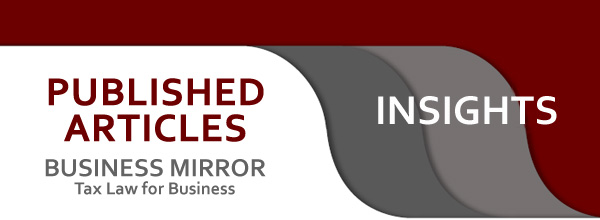
Sun Wind Ocean
By Atty. Irwin C. Nidea Jr.
The sun, wind and ocean are inexhaustible. So, no matter how many times you utilize their energy, they will never be diminished nor contained. This is why the Department of Justice (DOJ) and the Department of Energy (DOE) rising to the call for clean energy and as a positive response to fight climate change, have resolved to interpret Section 2, Article 12 of the 1987 Constitution in favor of our one and only planet Earth.
The DOJ has opined that exploration, development, and utilization of inexhaustible renewable sources, which includes the sun, wind and ocean, are not subject to the limitations of foreign ownership to 40% as prescribed under Section 2, Article 12 of the 1987 Constitution. In the said opinion, the DOJ ruled that the limitations of foreign ownership only apply to matters that are “susceptible to appropriation,” that would include coal deposits and waters, direct from the source.
According to the DOJ, what the Constitution seeks to preserve are the country’s “limited and exhaustible resources.” The phrase "all forces of potential energy" as stated in the Constitution does not include kinetic energy, such as the sun, wind and ocean.
The government is consciously bringing its acts together to develop a healthy fiscal and non-fiscal incentives for foreign investors. The tax incentives of RE developers have been amended and clarified in Revenue Regulations (RR) No. 7-2022. The said RR mandates that local supplier of goods, properties, and services must only require from the RE Developer a copy of the latter's BOI Registration and DOE Registration for VAT zero-rating to apply. Thus, local suppliers/sellers of goods, properties, and services of duly registered RE developers are not allowed to pass on the 12% VAT on the latter's purchases of goods, properties and services that will be used for the development, construction and installation of their power plant facilities. This includes the whole process of exploring and developing renewable energy services up to its conversion into power, including but not limited to the services performed by subcontractors and contractors.
All manufacturers, fabricators, and suppliers of locally produced RE equipment are also subject to zero-rated VAT on their transactions with local suppliers of goods, properties, and services needed in the manufacture/fabrication of RE equipment. They must only show their BOI and DOE certifications as well as the BOI and DOE certifications of the RE developers.
Local purchases are zero-rated. Importation of equipment necessary for the exploration and development of the facilities on the other hand, is vat exempt. But these equipment must among others, be proven as not having been manufactured domestically in reasonable quantity and quality at competitive prices, as certified by the Department of Trade and Industry (DTI). This policy aims to protect the local industry.
With the opening of the renewable industry to 100% foreign ownership, should this protection given to local suppliers be scrapped If the country is committed to encourage foreign investments in RE, it is better to set the tone with not many pre-conditions and red tape, and allow these foreign investors to bring their own technology and equipment, tax free. On the other hand, our local industry must be encouraged to grow and cope up with its more advanced foreign competitors. An economist would say that if our local industry cannot match the price and quality of foreign equipment, then they should close and look for an industry where they can be competitive. But a politician will of course have a different view.
The opening up of the RE industry to 100% foreign ownership is a first big leap that can pave the way to review this policy, and many others. But DOJ opinion remains as that – an opinion. The implementing rules of the Renewable Energy Act of 2008 must be amended to reflect this new direction. It is also an opportunity to review all other policies that may dampen foreign investor’s appetite.
The tax incentives given to renewable energy developers are substantial and at some point, are even more generous as compared to other industries. I hope that foreign investors will see this and be encouraged to help tap our vast oceans and tropical climate into clean energy. This will not only boost our economy but also help heal our planet.
----------------------------------------------
For inquiries on the article, you may call or email
ATTY. IRWIN C. NIDEA JR.
Senior Partner
T: +63 2 8403 2001 loc. 330
This email address is being protected from spambots. You need JavaScript enabled to view it.


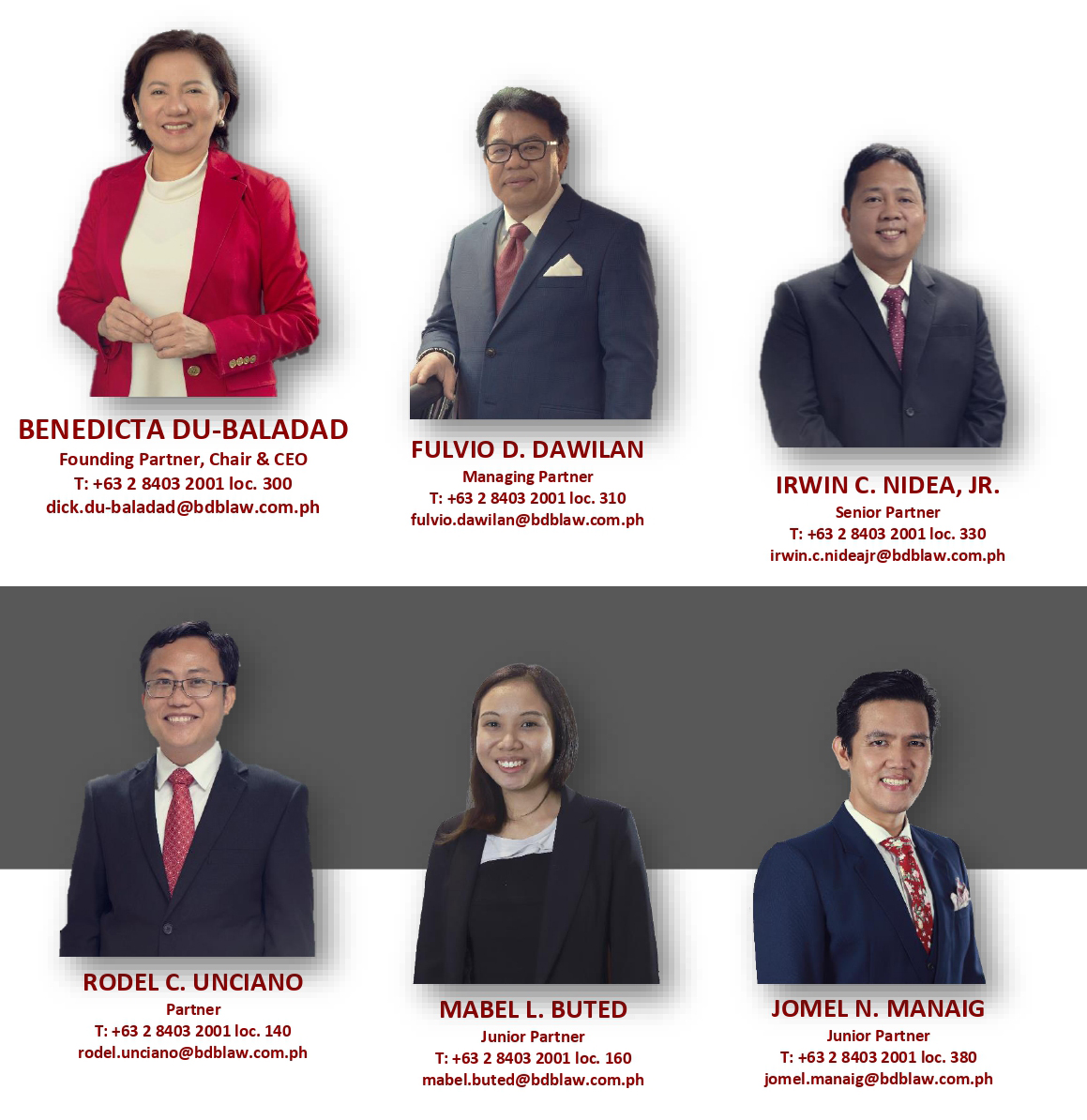
DISCLAIMER: The contents of this Insights are summaries of selected issuances from various government agencies, Court decisions and articles written by our experts. They are intended for guidance only and as such should not be regarded as a substitute for professional advice.
Copyright © 2022 by Du-Baladad and Associates (BDB Law). All rights reserved. No part of this issue covered by this copyright may be produced and/or used in any form or by any means – graphic, electronic and mechanical without the written permission of the publisher.





